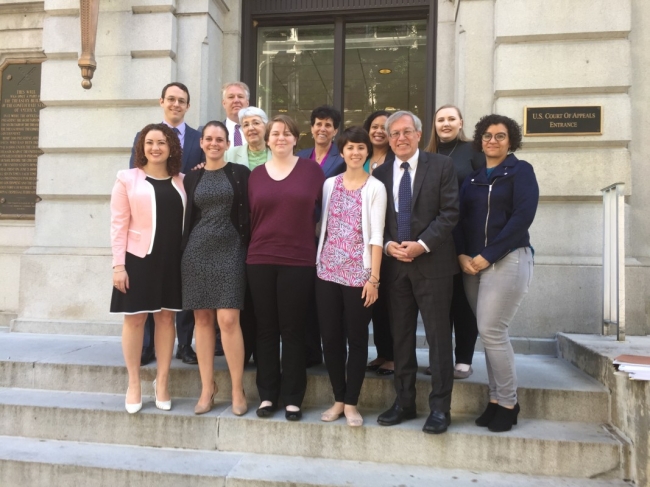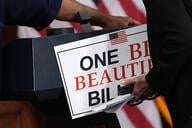You have /5 articles left.
Sign up for a free account or log in.

Mary Washington students and their lawyers at the appeals court
Feminist Majority Foundation
A federal appeals court ruled 2 to 1 on Wednesday that feminist students who sued the University of Mary Washington for failing to protect them from anonymous online harassment were entitled to pursue their lawsuit. The decision reversed a ruling by a lower court to throw out the lawsuit on First Amendment and other grounds. The suit, which says that an insufficient response by the university constituted illegal sex discrimination, could redefine how colleges respond to online threats on their campuses.
If the current ruling stands, some colleges may face pressure to do more than they do now when their students receive anonymous online harassment, a phenomenon common in higher education. The dissenting opinion warns that meeting the standard set by the majority could be difficult for many colleges and universities.
The appeals court ruling was not a final ruling on the case. But the majority decision suggested that the students who sued the university had a legitimate case, and some of the language in the decision suggested that the judges believed the case was strong. The case now goes back to a federal district judge.
At issue in the case is the harassment received in 2014 and 2015 by Feminists United, a campus group affiliated with the Feminist Majority Foundation, after students in the group took public stands on campus issues. First, they spoke out against the idea of bringing fraternities to campus. Then they criticized a sexist chant by members of the rugby team. When the team was suspended by the university, supporters of the team blamed the campus feminists.
Harassment came largely via Yik Yak, a now-defunct social media tool that used geotargeting to allow people on campus to make comments anonymously about others on the campus. In this case, the harassment was not the kind of mocking of feminists that is omnipresent online, but specific threats of violent acts, accompanied by the whereabouts of members of Feminists United, who were identified by name.
Among the comments: "Gonna tie these feminists to the radiator and [g]rape them in the mouth" and "Dandy’s about to kill a bitch … or two" and "Can we euthanize whoever caused this bullshit?" (The [g] before "rape" is believed to refer to gang rape, according to the majority decision.) Other posts on Yik Yak called the campus feminists group "femicunts, feminazis, cunts, bitches, hoes and dikes [sic].”
According to the court's opinion, the students who were harassed complained multiple times to various university administrators, who took what the lawsuit said were only minimal steps to stop the harassment. And the appeals court said the evidence backed the idea in the lawsuit that the university was "deliberately indifferent," or at least that there was enough evidence for the case to proceed to trial.
The university did condemn the harassment and organized forums to listen to the students talk about how the online comments made them feel unsafe. But much of the university's response, according to the court's opinion, was confined to rejecting the students' demand that Yik Yak be blocked on campus. The university said that doing so would violate the First Amendment (Mary Washington is a public university located in Virginia).
The majority decision doesn't say the university had an obligation to block Yik Yak. But it questions the way the university cited the First Amendment, in particular because of the specific violent threats made against specific students.
Says the decision: "First Amendment concerns do not render the university’s response to the sexual harassment and threats legally sufficient for two sound reasons: (1) true threats are not protected speech, and (2) the university had several responsive options that did not present First Amendment concerns."
The university, the decision says, "faces serious difficulties in its effort to convince us that the complaint does not sufficiently allege deliberate indifference." The university never tried to identify the students who were engaged in harassing the campus feminists, didn't speak out forcefully about what was going on and didn't offer much support to the victims of harassment, the decision said. The university might have tried mandatory assemblies on preventing sexual harassment, and university leaders could have made clear their opposition to the kinds of treatment experienced by the students who were harassed, the opinion said.
"UMW’s administrators, however, merely responded with two listening circles, a generic email and by sending a campus police officer with a threatened student on one evening after particularly aggressive and targeted Yaks," the decision says.
Judge Robert B. King wrote the 57-page decision, which was joined by Judge Pamela Harris.
G. Steven Agee filed a dissent in which he warned of the consequences of the decision. He explicitly invited Mary Washington to appeal (which it could do to either the full Fourth Circuit or the U.S. Supreme Court).
Wrote Agee: "Make no mistake, the majority’s novel and unsupported decision will have a profound effect, particularly on institutions of higher education … Institutions, like the university, will be compelled to venture into an ethereal world of non-university forums at great cost and significant liability, in order to avoid the Catch-22 Title IX liability the majority now proclaims. The university should not hesitate to seek further review."
The Feminist Majority Foundation issued a statement Wednesday praising the decision.
"The Feminist Majority Foundation took on this case to help our affiliate, Feminists United, fight for a safe campus free from online sexual harassment and threats, but we are thrilled that the Fourth Circuit’s ground-breaking decision will benefit students nationwide," the statement said. "Unlike the current Department of Education under Secretary [Betsy] DeVos, the Fourth Circuit is committed to enforcing Title IX [of the Education Amendments of 1972] and protecting students from sex-based discrimination, including when the harassment and threats are made online. The court understands that whether harassment is online or in person, the impact is the same: targeted students are cheated out of a safe learning environment."
The university issued this statement: "The University of Mary Washington has just received notice of the ruling, and, with the help of the [Virginia] Attorney General’s Office, will be thoroughly reviewing the majority and dissenting opinions before determining how best to proceed. The university remains committed to the safety and well-being of its students."
The Foundation for Individual Rights in Education, which advocates for free expression in higher education, backed the university in the appeals case and issued an analysis highly critical of the majority decision.
FIRE argued that the speech in question was protected. "Ultimately, it is almost impossible to conceive of this case being resolved without addressing this enormous elephant in the room; if the speech was constitutionally protected, and was not harassment, then the question of substantial control is irrelevant," FIRE said.
FIRE also warned of the "far-reaching implications for universities’ obligation to monitor and address the off-campus, online speech of … students."




